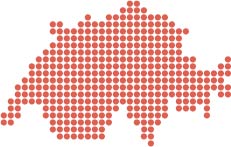Building Stock Model (BSM)
With its Energy Strategy 2050, Switzerland has set itself ambitious goals. The benchmarks of the 2000-watt society, which many planners, municipalities and cities in Switzerland are guided by, are similarly demanding. In terms of the attainability and implementation of these goals, various questions arise for these actors – but also for the energy suppliers. Depending on requirements, the Building Stock Model (BSM) and its various modules can be used for the following purposes and tasks:
- Target verification and/or feasibility check
- Strategic and operative energy planning (such as (district) heating networks, use of local potentials of renewable energies)
- Network planning, conception and planning of energy services
- Impact analysis and evaluation of (planned) energy policy measures
- Urban planning and site/area development
- National and municipal energy statistics
- Management of building portfolios
The BSM for a geospatial public energy strategy
As a representative of a public authority (federal, cantonal or municipal level), do you see yourself confronted with energy and climate policy goals or do you define your own strategy and goals?
Then you know that the exploitation of existing energy and efficiency potentials requires careful conception and foresighted planning. In many places, there are also grid-bound energy supplies such as gas, district and local heating networks that are already in operation, which can represent an economic challenge but also an energy policy opportunity.
With the BSM, energy demand can be calculated for different areas and cartographically represented for different scenarios up to 2060. Building technology, structural engineering, energy-specific and economic parameters as well as influencing factors are considered.
Our BSM helps you to develop a strategy, to define quantifiable goals and possible target paths, as well as to design energy planning measures and to check their impact, taking local conditions into account.
The BSM for energy companies and associations
How are energy efficiency, new energy applications and renewable energies changing energy sales? What consequences do local, cantonal and national energy strategies have on the energy and building market?
The BSM shows the future cost and technology development in the area of energy efficiency and for the use and provision of decentralised heat, cooling and electricity. On this basis, you will be supported in the evaluation and design of innovative service offers and new business models in the fields of energy efficiency and renewable energies.
The BSM for professional building owners or lenders
Is your own or financed real estate portfolio sustainable and climate-friendly in terms of energy consumption and greenhouse gas emissions? Would you like to develop a strategy for retrofit investments for your portfolio or manage the available funds optimally and use them in targeted measures so that certain future political framework conditions (such as MuKEN, Minergie, GEAK) are achieved?
The BSM is an ideal tool which supports you in analysing various long-term (retrofit) strategies for your building stock in terms of costs, energy savings and target achievement.
The BSM for additional users
The BSM allows the handling of a variety of other needs, such as the assessment of the impact of future energy guidelines, the retrospective analysis of energy demand (ex-post analyses) or the predictive modelling of energy consumption (energy prospects). Due to this versatility, the tool is also useful for the following additional users:
- for the SIA and other intermediaries: development of fundamentals for standards, fact sheets and recommendations
- for the construction industry and building management: proof of the benefits of lifecycle management
- for the public sector: impact analyses and energy planning of their own building stock
What can the Building Stock Model (BSM) be used for and on what data is it based?
With the Building Stock Model, past developments can be analysed and possible future trends can be mapped in various scenarios and with geospatial references. Depending on the issue at hand, we can use the Building Stock Model to show the following evaluation indicators, influencing factors and distinguishing features:
| Evaluation indicators | Influencing factors / Distinguishing features |
|
|
The Building Stock Model is based on Swiss, cantonal and communal statistics, results of surveys, studies and potential analyses, data from the Buildings and Housing Register (GWR) and the Company Register. In addition, energy consumption data and waste heat sources, zone plans as well as maps of site uses, grid-bound energy supplies such as gas, district and local heating networks and renewable energies are used.
Projects

Net-zero greenhouse gas emissions in the building sector | TEP Energy
Together with partners, TEP Energy is developing methodological principles (F0) based on the WLCNN method, examining the achievability of net-zero targets (F1) using technical and economic scenarios and developing implementation strategies (F2, F3) with technical and political concepts. In addition, existing standards are analysed in order to harmonize regulations and ensure comparability (F4).

Potential and feasibility study for heat supply in Aesch
The municipality of Aesch (BL) is developing a climate-friendly, economical and secure heat supply for households and businesses. The aim of the municipality is to achieve the national climate targets (net zero by 2050) and build a sustainable energy infrastructure. As part of the feasibility study, renewable energy sources for heating and hot water, including geothermal energy, local and district heating solutions and air-to-water heat pumps, were analysed. TEP Energy analysed their economic viability and possible implementation in various sub-areas. The study was carried out in collaboration with eicher+pauli, the municipality of Aesch and the Basel-Landschaft Office for Environmental Protection and Energy and forms the basis for the municipality's heat planning.

Energy renovation rates in the building sector
Various federal and cantonal energy and climate policy measures are aimed at significantly increasing the energy renovation rate. Based on this comprehensive survey, the report shows how the energy renovation rate has developed in recent years and how high it currently is.

CO₂ emissions tool for the ETH Board: analysis, scenarios and net zero by 2040
The ETH Board's CO2 emissions tool was adapted and expanded.

Municipal heat planning in Volketswil | TEP Energy
With reference to its climate policy objectives and as a result of its energy city process, the municipality of Volketswil is having its municipal energy planning revised.

Municipal energy planning in Glarus
Based on the cantonal energy law revision of 2021, the municipality of Glarus is revising its municipal energy planning with the aim of achieving a fossil-free heat supply. TEP Energy is supporting the municipality with its solutions, such as the Spatial Energy Analysis Toolbox (SEAT) and the building stock model, in order to achieve the energy and climate targets in a sustainable and economically efficient manner.

Energy Policy Simulator
TEP Energy is supporting the San Francisco based think tank Energy Innovation in the expansion of its Energy Policy Simulator (EPS).

SURE - SUstainable and REsilient energy for Switzerland
Sweet - SURE analyses the impact of disruptive events on the Swiss energy system. TEP Energy is working on energy demand topics such as the development of demand for energy sources in Switzerland, the impact of shocks on the demand load and the potential use of large heat pumps.

Country-specific Market Reports for Buildings
Building Market Briefs (BMB) is a Climate KIC initiative within the flagship Building Technologies Accelerator (BTA) that aims to gather and promote knowledge about the buildings' and construction sector to promote low carbon investment and scaling.

Swiss Energy Perspectives 2050+
To update the SFOE's energy perspectives, we are preparing the scenario results for the services and agricultural sector.

IEA ECB Annex 70: Analysis of Building Energy Data with a Scalable Building Stock Model
Relationship between building park modelling and real building and energy data.

Ex-Post Analysis of Energy Demand in the Swiss Service Sector
Together with Prognos and Infras, we periodically carry out ex-post analyses of the energy demand in Switzerland on behalf of the Swiss Federal Office of Energy (SFOE). TEP Energy is responsible for the sectors services and agriculture.

Evaluation of measures using impact and cost analysis within the "Solar Strategy” project
Review of the expansion path of solar energy in the cantons of Aargau and Zurich

Energy Law Report for the Canton of Basel-Landschaft
Development of a methodology for the periodic evaluation of the measures and goals of the canton's energy law.

The Role of Gas Infrastructure in the Future Energy System
Energy policy decisions and technological developments lead to an increase in fluctuating renewable energy production. More flexibility in the power grid and storage possibilities is required to which the buildings' sector may contribute.

CoolCity
Assessment of the potential for lake water use for heating and cooling in the city of Zurich

CREAM – Integrating Climate Change Mitigation, Resource Efficiency and Adaptation in Building Stock Modelling
Objectives, strategies and measures in the field of climate protection, energy planning and the further development of energy networks in cities are designed using the Building Park Model (GPM) in a cross-sectoral manner.

Study on the Subsidiary Ban of Fossil-Fuelled Heating Systems
Swiss climate policy is facing major challenges, especially in the buildings sector. The study investigated the effects of a possible ban on fossil-fuelled heating systems from 2030, if the climate targets cannot otherwise be achieved.

Extension of the Building Stock Model for the SIA Efficiency Path
Using the enhanced building stock model, the primary energy and greenhouse gas emissions of new buildings and renovation projects are compared with the target values to review the impact of energy policy objectives.

Analysis of the State of Insulation Materials in the Swiss Building Stock
With regard to energy and resource policy, we must ask ourselves how we will deal with insulating materials in the future.

Energy Supply Concept 2050 for the City of Zurich
The Energy Supply Concept 2050 used a scenario approach to show that the heat supply of the city of Zurich could meet the goals of the 2000-watt society.

Analysis of Market Opportunities and Potentials in the Heating and Cooling Sector
Evaluation of new market opportunities on behalf of a large Swiss electricity supplier.

Integration of embodied Energy into the Building Stock Model (BSM)
By 2050, the City of Zurich intends to fully meet the goals of the 2000-watt society. Energy consumption in existing buildings and embodied energy are also part of this scope.

Contributions to the ewz Energy Research Programme on the 2000-watt Society
«Energy Research City of Zurich» is a 10-year programme for applied energy research.

Pilot Study: Building Stock Model (BSM) for Office, School and Residential Buildings
In collaboration with the ETH Chair for Sustainable Building, we developed a pilot version of the building stock model for Switzerland and for the city of Zurich.
